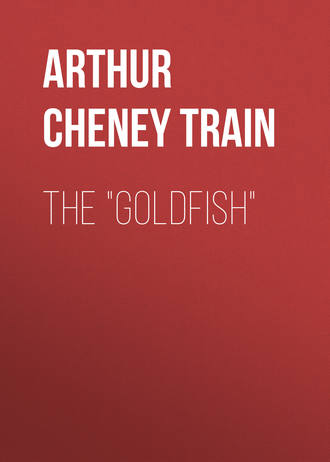 полная версия
полная версияThe "Goldfish"
"Look here, my good woman, you are all right enough in your own way, but we have nothing in common; and this proposed evening of enforced companionship will leave us both exhausted and ill-tempered. We shall grin and shout meaningless phrases over the fish, entrée and salad about life, death and the eternal verities; but we shall be sick to death of each other in ten minutes. Let's cut it out and go home!"
You are obliged, however, to escort your middle-aged comrade downstairs and take your seat beside her with a flourish, as if you were playing Rudolph to her Flavia. Then for two hours, with your eyes blinded by candlelight and electricity, you eat recklessly as you grimace first over your left shoulder and then over your right. It is a foregone conclusion that you will have a headache by the time you have turned, with a sensation of momentary relief, to your "fair companion" on the other side.
Have you enjoyed yourself? Have you been entertained? Have you profited? The questions are utterly absurd. You have suffered. You have strained your eyes, overloaded your stomach, and wasted three hours during which you might have been recuperating from your day's work or really amusing yourself with people you like.
This entirely conventional form of amusement is, I am told, quite unknown in Europe. There are, to be sure, occasional formal banquets, which do not pretend to be anything but formal. A formal banquet would be an intense relief, after the heat, noise, confusion and pseudo-informality of a New York dinner. The European is puzzled and baffled by one of our combined talk-and-eating bouts.
A nobleman from Florence recently said to me:
"At home, when we go to other people's houses it is for the purpose of meeting our own friends or our friend's friends. We go after our evening meal and stay as long as we choose. Some light refreshment is served, and those who wish to do so smoke or play cards. The old and the young mingle together. It is proper for each guest to make himself agreeable to all the others. We do not desire to spend money or to make a fête. At the proper times we have our balls and festas.
"But here in New York each night I have been pressed to go to a grand entertainment and eat a huge dinner cooked by a French chef and served by several men servants, where I am given one lady to talk to for several hours. I must converse with no one else, even if there is a witty, beautiful and charming woman directly opposite me; and as I talk and listen I must consume some ten or twelve courses or fail to do justice to my host's hospitality. I am given four or five costly wines, caviar, turtle soup, fish, mousse, a roast, partridge, pâté de fois gras, glacés, fruits, bonbons, and cigars costing two francs each. Not to eat and drink would be to insult the friend who is paying at least forty or fifty francs for my dinner. But I cannot enjoy a meal eaten in such haste and I cannot enjoy talking to one strange lady for so long.
"Then the men retire to a chamber from which the ladies are excluded. I must talk to some man. Perhaps I have seen an attractive woman I wish to meet. It is hopeless. I must talk to her husband! At the end of three-quarters of an hour the men march to the drawing room, and again I talk to some one lady for half an hour and then must go home! It may be only half-past ten o'clock, but I have no choice. Away I must go. I say good-night. I have eaten a huge dinner; I have talked to one man and three ladies; I have drunk a great deal of wine and my head is very tired.
"Nineteen other people have had the same experience, and it has cost my host from five hundred to a thousand francs—or, as you say here, from one hundred to two hundred dollars. And why has he spent this sum of money? Pardon me, my friend, if I say that it could be disbursed to much better advantage. Should my host come to Florence I should not dare to ask him to dinner, for we cannot afford to have these elaborate functions. If he came to my house he would have to dine en famille. Here you feast every night in the winter. Why? Every day is not a feast day!"
I devote space and time to this subject commensurate with what seems to me to be its importance. Dining out is the metropolitan form of social entertainment for the well-to-do. I go to such affairs at least one hundred nights each year. That is a large proportion of my whole life and at least one-half of all the time at my disposal for recreation. So far as I can see, it is totally useless and a severe drain on one's nervous centers. It has sapped and is sapping my vitality. During the winter I am constantly tired. My head aches a large part of the time. I can do only a half—and on some days only a third—as much work as I could at thirty-five.
I wake with a thin, fine line of pain over my right eye, and a heavy head. A strong cup of coffee sets me up and I feel better; but as the morning wears on, especially if I am nervous, the weariness in my head returns. By luncheon time I am cross and upset. Often by six o'clock I have a severe sick headache. When I do not have a headache I am usually depressed; my brain feels like a lump of lead. And I know precisely the cause: It is that I do not give my nerve-centers sufficient rest. If I could spend the evenings—or half of them—quietly I should be well enough; but after I am tired out by a day's work I come home only to array myself to go out to saw social wood.
I never get rested! My head gets heavier and heavier and finally gives way. There is no immediate cause. It is the fact that my nervous system gets more and more tired without any adequate relief. The feeling of complete restedness, so far as my brain is concerned, is one I almost never experience. When I do wake up with my head clear and light my heart sings for joy. My effectiveness is impaired by weariness and overeating, through a false effort at recuperation. I have known this for a long time, but I have seen no escape from it.
Social life is one of the objects of living in New York; and social life to ninety per cent of society people means nothing but eating one another's dinners. Men never pay calls or go to teas. The dinner, which has come to mean a heavy, elaborate meal, eaten amid noise, laughter and chatter, at great expense, is the expression of our highest social aspirations. Thus it would seem, though I had not thought of it before, that I work seven or eight hours every day in order to make myself rather miserable for the rest of the time.
"I am going to lie down and rest this afternoon," my wife will sometimes say. "We're dining with the Robinsons."
Extraordinary that pleasure should be so exhausting as to require rest in anticipation! Dining with these particular and other in-general Robinsons has actually become a physical feat of endurance—a tour de force, like climbing the Matterhorn or eating thirteen pounds of beefsteak at a sitting. Is it a reminiscence of those dim centuries when our ancestors in the forests of the Elbe sat under the moss-hung oaks and stuffed themselves with roast ox washed down with huge skins of wine? Or is it a custom born of those later days when, round the blazing logs of Canadian campfires, our Indian allies gorged themselves into insensibility to the sound of the tom-tom and the chant of the medicine-man—the latter quite as indispensable now as then?
If I should be called on to explain for what reason I am accustomed to eat not wisely but too well on these joyous occasions, I should be somewhat at a loss for any adequate reply. Perhaps the simplest answer would be that I have just imbibed a cocktail and created an artificial appetite. It is also probable that, in my efforts to appear happy and at ease, to play my part as a connoisseur of good things, and to keep the conversational ball in the air, I unconsciously lose track of the number of courses I have consumed.
It is also a matter of habit. As a boy I was compelled to eat everything on my plate; and as I grew older I discovered that in our home town it was good manners to leave nothing undevoured and thus pay a concrete tribute to the culinary ability of the hostess. Be that as it may, I have always liked to eat. It is almost the only thing left that I enjoy; but, even so, my palate requires the stimulus of gin. I know that I am getting fat. My waistcoats have to be let out a little more every five or six months. Anyhow, if the men did not do their part there would be little object for giving dinner parties in these days when slender women are the fashion.
After the long straight front and the habit back, social usage is frowning on the stomach, hips and other heretofore not unadmired evidences of robust nutrition. Temperance, not to say total abstinence, has become de rigueur among the ladies. My dinner companion nibbles her celery, tastes the soup, waves away fish, entrée and roast, pecks once or twice at the salad, and at last consumes her ration of ice-cream with obvious satisfaction. If there is a duck—well, she makes an exception in the case of duck—at six dollars and a half a pair. A couple of hothouse grapes and she is done.
It will be observed that this gives her all the more opportunity for conversation—a doubtful blessing. On the other hand, there is an equivalent economic waste. I have no doubt each guest would prefer to have set before her a chop, a baked potato and a ten-dollar goldpiece. It would amount to the same thing, so far as the host is concerned.
* * * * *I had, until recently, assumed with some bitterness that my dancing days were over. My wife and I went to balls, to be sure, but not to dance. We left that to the younger generation, for the reason that my wife did not care to jeopardize her attire or her complexion. She was also conscious of the fact that the variety of waltz popular thirty years ago was an oddity, and that a middle-aged woman who went hopping and twirling about a ballroom must be callous to the amusement that followed her gyrations.
With the advent of the turkey trot and the tango, things have changed however. No one is too stout, too old or too clumsy to go walking solemnly round, in or out of time to the music. I confess to a consciousness of absurdity when, to the exciting rhythm of Très Moutard, I back Mrs. Jones slowly down the room and up again.
"Do you grapevine?" she inquires ardently. Yes; I admit the soft impeachment, and at once she begins some astonishing convolutions with the lower part of her body, which I attempt to follow. After several entanglements we move triumphantly across the hall.
"How beautifully you dance!" she pants.
Aged roisterer that I am, I fall for the compliment. She is a nice old thing, after all!
"Fish walk?" asks she.
I retort with total abandon.
"Come along!"
So, grabbing her tightly and keeping my legs entirely stiff—as per instructions from my son—I stalk swiftly along the floor, while she backs with prodigious velocity. Away we go, an odd four hundred pounds of us, until, exhausted, we collapse against the table where the champagne is being distributed.
Though I have carefully followed the directions of my preceptor, I am aware that the effect produced by our efforts is somehow not the same as his. I observe him in a close embrace with a willowy young thing, dipping gracefully in the distance. They pause, sway, run a few steps, stop dead and suddenly sink to the floor—only to rise and repeat the performance.
So the evening wears gaily on. I caper round—now sedately, now deliriously—knowing that, however big a fool I am making of myself, we are all in the same boat. My wife is doing it, too, to the obvious annoyance of our daughters. But this is the smartest ball of the season. When all the world is dancing it would be conspicuous to loiter in the doorway. Society has ruled that I must dance—if what I am doing can be so called.
I am aware that I should not care to allow my clients to catch an unexpected glimpse of my antics with Mrs. Jones; yet to be permitted to dance with her is one of the privileges of our success. I might dance elsewhere but it would not be the same thing. Is not my hostess' hoarse, good-natured, rather vulgar voice the clarion of society? Did not my wife scheme and plot for years before she managed to get our names on the sacred list of invitations?
To be sure, I used to go to dances enough as a lad; and good times I had too. The High School Auditorium had a splendid floor; and the girls, even though they were unacquainted with all these newfangled steps, could waltz and polka, and do Sir Roger de Coverley. Good old days! I remember my wife—met her in that old hall. She wore a white muslin dress trimmed with artificial roses. I wonder if I properly appreciate the distinction of being asked to Mrs. Jones' turkey-trotting parties! My butler and the kitchen-maid are probably doing the same thing in the basement at home to the notes of the usefulman's accordion—and having a better time than I am.
It is a pleasure to watch my son or my daughters glide through the intricacies of these modern dances, which the natural elasticity and suppleness of youth render charming in spite of their grotesqueness. But why should I seek to copy them? In spite of the fact that I am still rather athletic I cannot do so. With my utmost endeavor I fail to imitate their grace. I am getting old. My muscles are stiff and out of training. My wind has suffered. Mrs. Jones probably never had any.
And if I am ridiculous, what of her and the other women of her age who, for some unknown reason, fatuously suppose they can renew their lost youth? Occasionally luck gives me a débutante for a partner when I go out to dinner. I do my best to entertain her—trot out all my old jokes and stories, pay her delicate compliments, and do frank homage to her youth and beauty. But her attention wanders. My tongue is stiff, like my legs. It can wag through the old motions, but it has lost its spontaneity. One glance from the eye of the boy down the long table and she is oblivious of my existence. Should I try to dance with her I should quickly find that crabbed middle-age and youth cannot step in time. My place is with Mrs. Jones—or, better, at home and in bed.
Apart, however, from the dubious delight of dancing, all is not gold that glitters socially. The first time my wife and I were invited to a week-end party at the country-house of a widely known New York hostess we were both much excited. At last we were to be received on a footing of real intimacy by one of the inner circle. Even my valet, an imperturbable Englishman who would have announced that the house was on fire in the same tone as that my breakfast was ready, showed clearly that he was fully aware of the significance of the coming event. For several days he exhibited signs of intense nervous anxiety, and when at last the time of my departure arrived I found that he had filled two steamer trunks with the things he regarded as indispensable for my comfort and well-being.
My wife's maid had been equally assiduous. Both she and the valet had no intention of learning on our return that any feature of our respective wardrobes had been forgotten; since we had decided not to take either of our personal servants, for the reason that we thought to do so might possibly be regarded as an ostentation.
I made an early getaway from my office on Friday afternoon, met my wife at the ferry, and in due course, but by no means with comfort, managed to board the train and secure our seats in the parlor car before it started. We reached our destination at about half-past four and were met by a footman in livery, who piloted us to a limousine driven by a French chauffeur. We were the only arrivals.
In my confusion I forgot to do anything about our trunks, which contained our evening apparel. During the run to the house we were both on the verge of hysteria owing to the speed at which we were driven—seventy miles an hour at the least. And at one corner we were thrown forward, clear of the seats and against the partition, by an unexpected stop. An interchange of French profanity tinted the atmosphere for a few moments and then we resumed the trajectory of our flight.
We had expected to be welcomed by our hostess; but instead we were informed by the butler that she and the other guests had driven over to watch a polo game and would probably not be back before six. As we had nothing to do we strolled round the grounds and looked at the shrubbery for a couple of hours, at the end of which period we had tea alone in the library. We had, of course, no sooner finished than the belated party entered, the hostess full of vociferous apologies.
I remember this occasion vividly because it was my first introduction to that artificially enforced merriment which is the inevitable concomitant of smart gatherings in America. The men invariably addressed each other as Old Man and the women as My Dear. No one was mentioned except by his or her first name or by some intimate diminutive or abbreviation. It seemed to be assumed that the guests were only interested in personal gossip relating to the marital infelicities of the neighboring countryside, who lost most at cards, and the theater. Every remark relating to these absorbing subjects was given a feebly humorous twist and greeted with a burst of hilarity. Even the mere suggestion of going upstairs to dress for dinner was a sufficient reason for an explosion of merriment. If noise was an evidence of having a good time these people were having the time of their lives. Personally I felt a little out of my element. I had still a lingering disinclination to pretend to a ubiquity of social acquaintance that I did not really possess, and I had never learned to laugh in a properly boisterous manner. But my wife appeared highly gratified.
Delay in sending to the depot for our trunks—the fault of the butler, to whom we turned over our keys—prevented, as we supposed, our getting ready in time for dinner. Everybody else had gone up to dress; so we also went to our rooms, which consisted of two huge apartments connected by a bathroom of similar acreage. The furniture was dainty and chintz-covered. There was an abundance of writing paper, envelopes, magazines and French novels. Superficially the arrangements were wholly charming.
The baggage arrived at about ten minutes to eight, after we had sat helplessly waiting for nearly an hour. The rooms were plentifully supplied with buttons marked: Maid; Valet; Butler's Pantry—and so on. But, though we pressed these anxiously, there was no response. I concluded that the valet was hunting or sleeping or otherwise occupied. I unpacked my trunks without assistance; my wife unpacked hers. But before I could find and assemble my evening garments I had to unwrap the contents of every tray and fill the room knee-high with tissue-paper.
Unable to secure any response to her repeated calls for the maid, my wife was nearly reduced to tears. However, in those days I was not unskillful in hooking up a dress, and we managed to get downstairs, with ready apologies on our lips, by twenty minutes of nine. We were the first ones down however.
The party assembled in a happy-go-lucky manner and, after the cocktails had been served, gathered round the festive board at five minutes past nine. The dinner was the regulation heavy, expensive New York meal, eaten to the accompaniment of the same noisy mirth I have already described. Afterward the host conducted the men to his "den," a luxurious paneled library filled with rare prints, and we listened for an hour to the jokes and anecdotes of a semiprofessional jester who took it on himself to act as the life of the party. It was after eleven o'clock when we rejoined the ladies, but the evening apparently had only just begun; the serious business of the day—bridge—was at hand. But in those days my wife and I did not play bridge; and as there was nothing else for us to do we retired, after a polite interval, to our apartments.
While getting ready for the night we shouted cheerfully to one another through the open doors of the bathroom and, I remember, became quite jolly; but when my wife had gone to bed and I tried to close the blinds I discovered that there were none. Now neither of us had acquired the art of sleeping after daylight unless the daylight was excluded. With grave apprehension I arranged a series of makeshift screens and extinguished the lights, wandering round the room and turning off the key of each one separately, since the architect had apparently forgotten to put in a central switch.
If there had been no servants in evidence when we wanted them before dinner, no such complaint could be entered now. There seemed to be a bowling party going on upstairs. We could also hear plainly the rattle of dishes and a lively interchange of informalities from the kitchen end of the establishment. We lay awake tensely. Shortly after one o'clock these particular sounds died away, but there was a steady tramp of feet over our heads until three. About this hour, also, the bridge party broke up and the guests came upstairs.
There were no outside doors to our rooms. Bells rang, water ran, and there was that curious vibration which even hairbrushing seems to set going in a country house. Then with a final bang, comparative silence descended. Occasionally still, to be sure, the floor squeaked over our heads. Once somebody got up and closed a window. I could hear two distant snorings in major and minor keys. I managed to snatch a few winks and then an alarm-clock went off. At no great distance the scrubbing maid was getting up. I could hear her every move.
The sun also rose and threw fire-pointed darts at us through the windowshades. By five o'clock I was ready to scream with nerves; and, having dug a lounge suit out of the gentlemen's furnishing store in my trunk, I cautiously descended into the lower regions. There was a rich smell of cigarettes everywhere. In the hall I stumbled over the feet of the sleeping night-watchman. But the birds were twittering in the bushes; the grassblades threw back a million flashes to the sun.
Not before a quarter to ten could I secure a cup of coffee, though several footmen, in answer to my insistent bell, had been running round apparently for hours in a vain endeavor to get it for me. At eleven a couple of languid younger men made their appearance and conversed apathetically with one another over the papers. The hours drew on.
Lunch came at two o'clock, bursting like a thunder-storm out of a sunlit sky. Afterward the guests sat round and talked. People were coming to tea at five, and there was hardly any use in doing anything before that time. A few took naps. A young lady and gentleman played an impersonal game of tennis; but at five an avalanche of social leaders poured out of a dozen shrieking motors and stormed the castle with salvos of strident laughter. The cannonade continued, with one brief truce in which to dress for dinner, until long after midnight. Vox, et praeterea nihil!
I look back on that house party with vivid horror. Yet it was one of the most valuable of my social experiences. We were guests invited for the first time to one of the smartest houses on Long Island; yet we were neglected by male and female servants alike, deprived of all possibility of sleep, and not the slightest effort was made to look after our personal comfort and enjoyment by either our host or hostess. Incidentally on my departure I distributed about forty dollars among various dignitaries who then made their appearance.
It is probable that time has somewhat exaggerated my recollections of the miseries of this our first adventure into ultrasmart society, but its salient characteristics have since repeated themselves in countless others. I no longer accept week-end invitations;—for me the quiet of my library or the Turkish bath at my club; for they are all essentially alike. Surrounded by luxury, the guests yet know no comfort!
After a couple of days of ennui and an equal number of sleepless nights, his brain foggy with innumerable drinks, his eyes dizzy with the pips of playing cards, and his ears still echoing with senseless hilarity, the guest rises while it is not yet dawn, and, fortified by a lukewarm cup of faint coffee boiled by the kitchen maid and a slice of leatherlike toast left over from Sunday's breakfast, presses ten dollars on the butler and five on the chauffeur—and boards the train for the city, nervous, disgruntled, his digestion upset and his head totally out of kilter for the day's work.
Since my first experience in house parties I have yielded weakly to my wife's importunities on several hundred similar occasions. Some of these visits have been fairly enjoyable. Sleep is sometimes possible. Servants are not always neglectful. Discretion in the matter of food and drink is conceivable, even if not probable, and occasionally one meets congenial persons.





